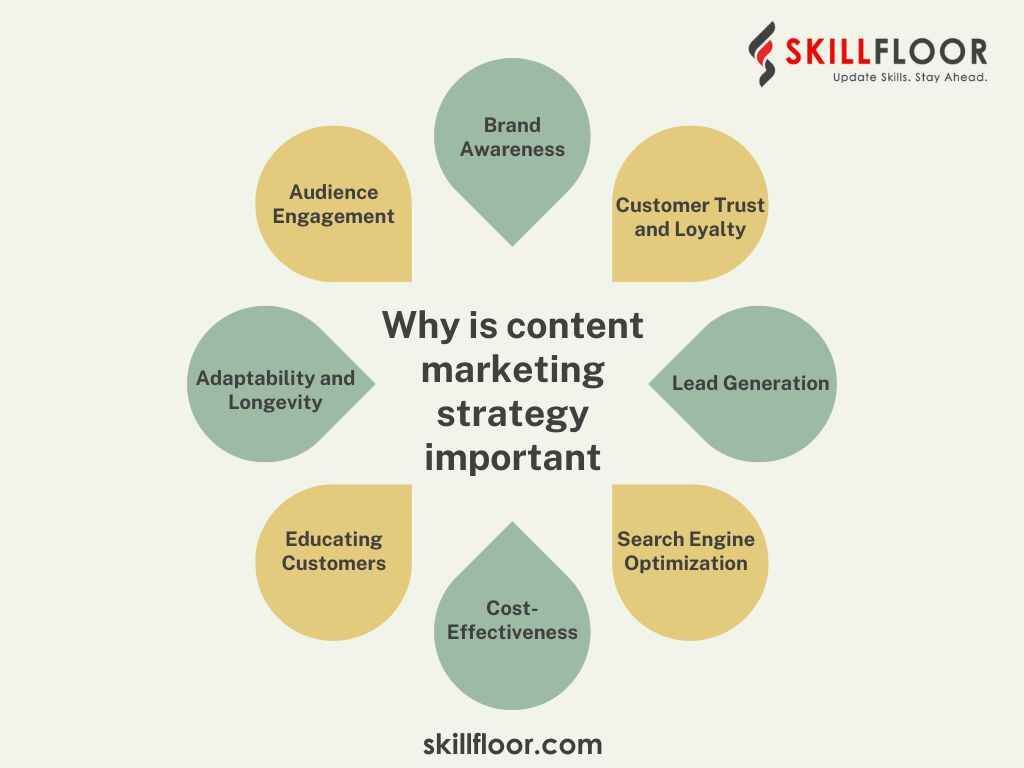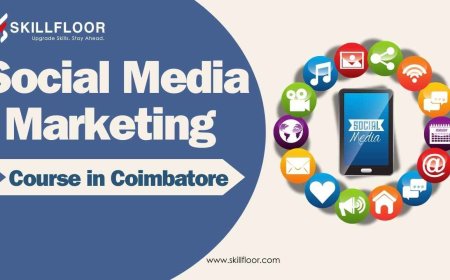what is a content marketing strategy?
Learn what a content marketing strategy is, how to develop one, and its importance for driving traffic, engagement, and conversions for your business.

A content marketing strategy is a complete strategy designed to produce and distribute relevant, high-quality material to draw in and keep the interest of a certain audience. It entails determining the demands of the target audience, producing excellent content, distributing it across a variety of platforms, successfully promoting it, tracking results, and adjusting the strategy in light of new information. By providing content that speaks to their audience's interests and solves their problems, organizations may use this strategic approach to create authority, foster trust, and eventually increase the number of clients they have.
A content marketing strategy helps a business stand out in a crowded online market by creating and distributing interesting material that speaks to the needs and interests of its target audience. A well-crafted content marketing strategy helps businesses, amid a sea of digital noise, to foster deeper connections, drive engagement, and ultimately convert prospects into loyal customers. This is true whether the business is a startup looking to establish industry authority or a well-established company looking to maintain relevance.
What is content marketing?
Content marketing is a way for companies to reach people by sharing helpful or interesting content instead of just advertising their products. It's about creating and sharing valuable information to attract and keep customers.
Challenges in content marketing strategy
-
Producing Quality Content Consistently: Maintaining a steady stream of high-quality content can be challenging, particularly when faced with time constraints, resource limitations, or creative blocks.
-
Standing Out in a Crowded Market: With an abundance of content available online, breaking through the noise and capturing the audience's attention can be difficult, requiring unique and compelling content that offers genuine value.
-
Understanding Audience Needs and Preferences: Identifying and addressing the specific needs, interests, and pain points of the target audience requires thorough research and ongoing audience analysis, which can be time-consuming and complex.
-
Content Distribution and Promotion: Even with great content, reaching the right audience and effectively promoting it across various channels can present challenges, requiring a well-defined distribution strategy and investment in promotion efforts.
-
Measuring ROI and Effectiveness: Determining the impact of content marketing efforts on business goals and ROI can be challenging, as measuring intangible metrics like brand awareness, engagement, and loyalty requires sophisticated analytics and attribution models.
-
Keeping Up with Trends and Algorithms: Staying abreast of evolving trends, technologies, and algorithm changes across different platforms (e.g., social media, search engines) is crucial for maintaining relevance and maximizing reach, but it can also be time-consuming and resource-intensive.
-
Balancing Quantity and Quality: Striking the right balance between producing a high volume of content and ensuring each piece maintains quality and relevance to the target audience is a constant challenge, particularly with limited resources.
-
Content Personalization and Segmentation: Tailoring content to different audience segments and personalizing the user experience requires a granular understanding of audience demographics, preferences, and behaviors, which can be challenging to execute effectively at scale.
Why is content marketing strategy important?

-
Audience Engagement: A well-defined content marketing strategy helps businesses connect with their target audience on a deeper level by providing content that resonates with their interests, needs, and pain points.
-
Brand Awareness: Consistently creating and sharing valuable content allows businesses to increase their visibility and establish themselves as industry leaders, thereby enhancing brand recognition and recall.
-
Customer Trust and Loyalty: By delivering relevant and helpful content, businesses can build trust with their audience, leading to stronger customer relationships and increased loyalty over time.
-
Lead Generation: Content marketing can attract potential customers who are searching for solutions or information related to the business's products or services, thereby generating leads and driving sales opportunities.
-
Search Engine Optimization (SEO): Producing high-quality content that is optimized for relevant keywords can improve a business's search engine rankings, driving organic traffic to its website and increasing its online visibility.
-
Cost-Effectiveness: Compared to traditional advertising methods, content marketing can be more cost-effective while potentially delivering higher returns on investment, particularly over the long term.
-
Educating Customers: Content marketing allows businesses to educate their audience about their industry, products, or services, helping potential customers make informed purchasing decisions.
-
Adaptability and Longevity: A robust content marketing strategy can adapt to changing trends and consumer preferences, providing a sustainable marketing approach that can deliver results over the long term.
What content can you use in your content marketing strategy?
-
Blog Posts: Informative articles that address specific topics, answer common questions, or provide insights relevant to your target audience.
-
Infographics: Visual representations of data or information, designed to be easily understandable and shareable, often used to convey complex concepts or statistics.
-
Videos: Engaging video content that can include tutorials, product demonstrations, behind-the-scenes footage, customer testimonials, or entertaining storytelling.
-
Social Media Posts: Short-form content posted on social media platforms such as Facebook, Instagram, Twitter, LinkedIn, or TikTok, including text updates, images, videos, polls, and stories.
-
Podcasts: Audio recordings featuring discussions, interviews, or storytelling relevant to your industry or audience's interests, distributed through podcasting platforms like Spotify or Apple Podcasts.
-
Ebooks and Whitepapers: In-depth resources providing comprehensive information, analysis, or research findings on a particular topic, often used to generate leads or establish thought leadership.
-
Case Studies: Detailed accounts of how your products or services have helped specific customers or clients achieve success, showcasing real-world examples and outcomes.
-
Email Newsletters: Regularly distributed emails containing updates, announcements, curated content, or exclusive offers, sent to subscribers who have opted in to receive communications from your brand.
How to Analyze Your Content Marketing Strategy Success
-
Define Key Performance Indicators (KPIs): Identify specific metrics that align with your content marketing goals, such as website traffic, engagement (likes, shares, comments), conversion rates, lead generation, or customer retention.
-
Track Metrics Consistently: Use analytics tools like Google Analytics, social media insights, or email marketing platforms to monitor and track the performance of your content regularly.
-
Assess Content Performance: Analyze the performance of individual pieces of content to identify which types, topics, formats, or distribution channels resonate most with your audience and drive the desired results.
-
Audience Engagement: Measure the level of engagement with your content, including metrics like time spent on a page, bounce rate, social shares, and comments, to gauge audience interest and interaction.
-
Conversion Rates: Evaluate how effectively your content contributes to achieving conversion goals, such as email sign-ups, lead generation, sales, or other desired actions taken by your audience.
-
ROI (Return on Investment): Calculate the return on investment for your content marketing efforts by comparing the costs associated with creating and promoting content to the revenue generated or other tangible benefits achieved.
-
Content Distribution Channels: Assess the performance of different distribution channels (e.g., website, social media, email, guest posting) to determine which channels are most effective at reaching and engaging your target audience.
-
SEO Performance: Monitor your content's search engine optimization (SEO) performance by tracking rankings, organic traffic, and keyword performance to ensure your content is being discovered by your target audience.
To succeed in the current digital environment, firms must have a strong content marketing plan. Through the production and dissemination of content that is valuable to its intended audience, businesses may gain credibility, foster trust, and increase consumer engagement and loyalty. Furthermore, companies may improve their approach, maximize their return on investment, and optimize their content by using key performance indicators to analyze the effectiveness of their content marketing plan. Ultimately, spending money on a well-thought-out content marketing plan helps companies develop over the long term by fostering genuine connections with their audience and making them stand out in a crowded online market.






























































